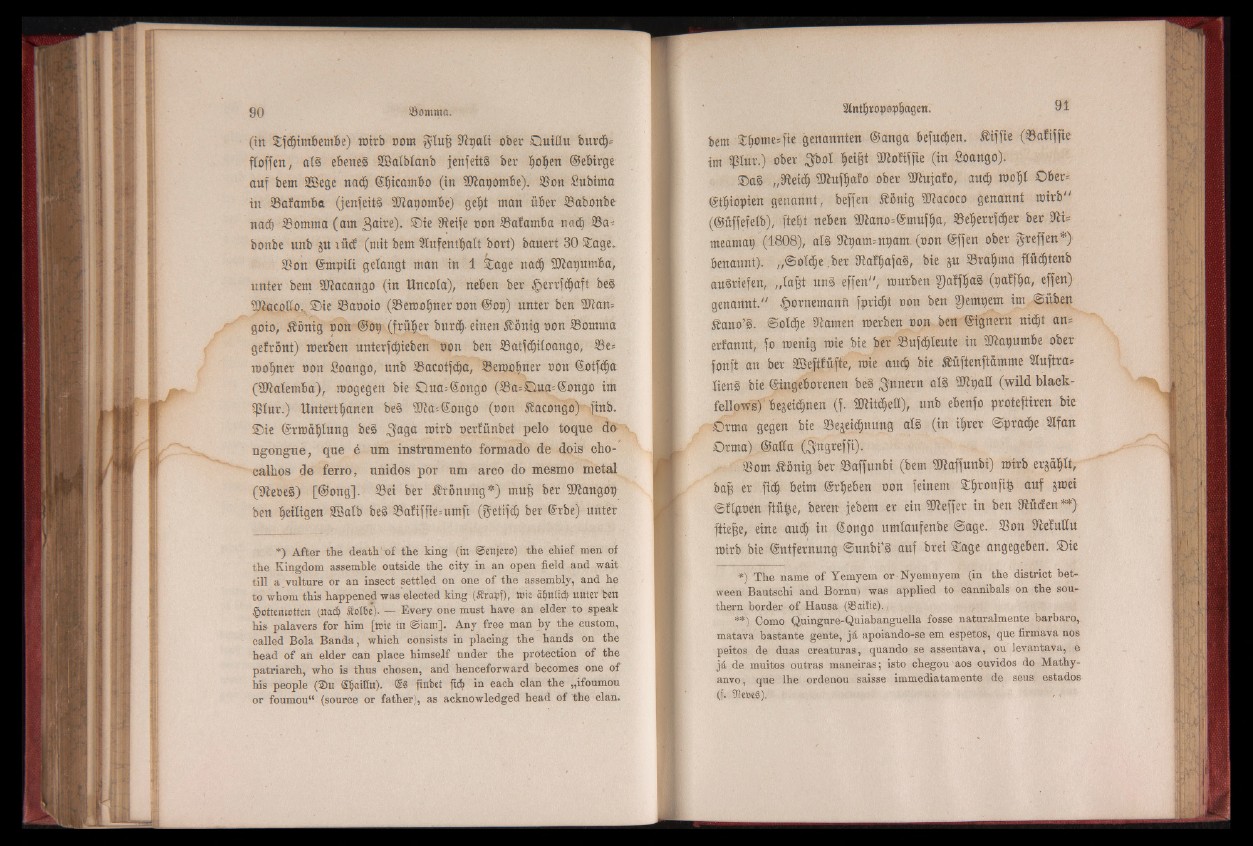
(in Stfdjimbembe) tnirb nom glufj f t p l t ober Ouiflu burcfp
floffen, al§ ebenes SCBalblanb jenfeit§ ber bofjen ©ebirge
auf bem SBege na<b ©fjicambo (in SUfapombe). 23on Subima
in 23afamba (jenfeitä SDiapombe) ge|t man über 23abonbe
nad) 23omma (am 3atre). ^ eife D°n ®ofamba nadj 23a-
bonbe unb $u xücf (mit bem 2lufentf)alt bort) bauert 30 Sage»
23on ©mpiti gelangt man in 1 Sage nad) SJfapumba,
unter bem üftacango (in Uncola), neben ber £»errfd)aft be§
Sftacolio.. Sie 23anoio (23emoIjner non ©op) unter ben 2Jian=
goio, $onig non ©09 (früher burd) einen JSonig non 23otnma
gefront) merben unterfdjiebcn non ben 23atfd)iloango, 23e=
moaner non Soango, unb 23acotfd)a, 23en>o|ner non ©otfdja
(Slialemba), mogegen bie Oua^©ongo (23a=Oua=©ongo im
ißtur.) Untertanen be§ 3Jta=©ongo (non Jiacongo) finb.
S)ie ©rtnafjlttng be§ ^aga tnirb nerfiinbet pelo toque do
ngongue, que e um instrumento formado de dois cho-
ealhos de ferro, unidos por um arco do mesmo metal
(9teoe§) [®ong]. 23ei ber Krönung*) muf ber Sftangop
ben heiligen SBalb be§ 95afiffte=umft (getifd) ber ©rbe) unter
*) After the death of the king (in @cnjero) the chief men of
the Kingdom assemble outside the city in an open field and wait
till a vulture or an insect settled on one of the assembly, and he
to whom this happened was elected king (Srapf), tt>ie ciimliä? unter ben
Hottentotten (nadj Selbe). — Every one must have an elder to speak
his palavers for him [toie in @iam]. Any free man by the custom,
called Bola Banda, which consists in placing the hands on the
head of ah elder can place himself under the protection of the
patriarch, who is thus chosen, and henceforward becomes one of
his people (®u ©jatttu). @8 ftnbet fid) in each clan the „ifoumou
or foumou“ (source or father), as acknowledged head of the clan.
bem genannten ©anga befudjen. iSiffte (23afiffie
im $lur.) ober 3bol SMffie (in Soango).
®a§ „Sfteidj 3Jhtfl)afo ober fDiujafo, auc§ niobi Ober=
©tbiopien genannt, beffen ®onig HJtacoco genannt mirb"
(©üffefelb), fteljt neben 2ftano=@muflja, 23eberrf^er ber 3^i=
meamap (1808), als Sfpam-npam. (non ©ffen ober greifen*)
benannt), „©oldje.ber 3ftaf^afa§, bie p 23rabma fiüctjtenb
au§riefen, ,,Iafst un§ effen", rourben 2)affl)a§ (palffja, effen)
genannt." fjornemann fpric^t non ben 2)empem im ©üben
Äano’S. ©oldje tarnen merben non ben ©ignern nidjt an=
erfannt, fo raenig mie bie ber 23ufd)leute in SDiapumbe ober
fonft an ber Sßeftfüfte, mie and) bie Äüftenft&mme 2luftra=
lien§ bie ©ingeborenen be§ ^nnern al§ TOpalt (wild black-
fellows)'beseidbnen (f. MtdjeU), unb ebenfo proteftiren bie
Orma gegen bie 23e^eid)nuug al§ (in ibrer ©pradje 2lfan
Orma) ©alla (3 n9reffi)-
23om Jfonig ber 23affunbi (bem Slìaffunbi) tnirb ergagli,
baf? er fid) beim ©rieben non feinem £l)ronfi$ auf p e i
©fipnen fiüfce, bereu jebem er ein Keffer in ben fRüden**)
fließe, eine audj in ©ongo umlaufenbe ©age. 23on SRefullu
tntrb bie ©ntfernung ©unbi'§ auf brei £age angegeben. Oie
*) The name of Yemyem or Nyemnyem (in the district between
Bautschi and Bornu) was applied to cannibals on the southern
border of Hausa (33ai!te).,
**) Como Q.uingure-Quiabanguella fosse naturalmente barbaro,
matava bastante gente, jä apoiando-se em espetos, que firmava nos
peitos de duas creaturas, quando se assentava, ou levantava, e
jà de muitos outras maneiras ; isto chegou aos ouvidos do Mathy-
anvo, que lhe ordenou saisse immediatamente de seus estados
(f. Vetoes).